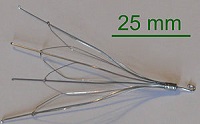
IVC filters are small wire devices that resemble a spider. Placed within the inferior vena cava, the wire fingers of the device are designed to catch blood clots and filter them from the bloodstream before they can make their way to the heart and cause a pulmonary embolism. While most devices, such as the OptEase filter, are designed to only be temporarily implanted into the patient, filters like the TrapEase device were created as a permanent solution to the condition.
Regardless of the intended level of permanence, less than a third of all IVC filters are ever retrieved after being implanted. Unfortunately, the consequences of leaving them in place can be catastrophic.
IVC filters fail and break at an alarmingly high rate. The wire fingers of the filter can break off and migrate throughout the body and perforate organs and the inferior vena cava itself. The filter can also move and tilt, thus negating any benefits of having it implanted in the first place. Other failures can result in the filter becoming embedded within the walls of the inferior vena cava. This makes retrieval of the device significantly more difficult and, at times, impossible.
The injuries sustained by the plaintiffs in the California IVC lawsuits are an illustration of almost every way an IVC filter can fail the patient and harm that whom it is intended to protect. While some had their IVC filters malfunction and tilt, others would find that their filters had perforated the inferior vena cava itself. Some still have their filters implanted, as the devices became so embedded into the inferior vena cava that it was not possible to remove them without doing any more damage. One plaintiff lost his wife when her IVC filter malfunctioned and actually allowed blood clots to get past the filter. She would suffer a pulmonary embolism and die as a result of that failure.
Cordis is accused of selling a defective medical device as well as failing to warn doctors and their patients of the dangers presented by IVC filters, as studies cited in the lawsuit paint a bleak picture of the failure rates of the company’s devices. For example, the TrapEase filter – designed for permanent use – showed a 64% fracture rate when left in place for more than four years. The device failed 23.1% of the time when implanted for a minimum of just 46 months. The temporary OptEase device showed a 37.5% failure rate over the same time.
As of this writing there are over 7,000 IVC filter lawsuits pending in state and federal courts around the country involving Cordis and other manufacturers including C.R. Bard, Cook Medical, and others.
